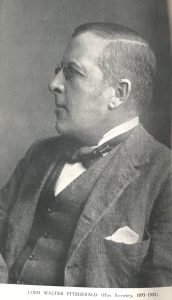OBITUARY LORD WALTER FITZGERALD
The noted antiquarian Lord Walter Fitzgerald (fourth son of the 4th Duke of Leinster) passed away at his residence Kilkea Castle on 31 July 1923. A founding member of the County Kildare Archaeological Society and sometimes Secretary, he made an immense contribution to the study of the archaeology and history of County Kildare throughout his life through his writings and public talks. He was also a frequent contributor to the Journal of the Association for the Preservation of the Memorials of the Dead in Ireland (editor from 1904 onwards) and to the Journal of the Royal Society of Antiquaries of Ireland and elsewhere.
Below is an obituary that appeared in the Nationalist & Leinster Times edition of Saturday 4 August 1923.
OBITUARY
LORD WALTER FITZGERALD
It is with feelings of great regret we announce the death of Lord Walter Fitzgerald, which occurred at his residence, Kilkea Castle, Castledermot, on Tuesday last after a very short illness. On the previous Saturday he had a seizure while carrying on some works in the Castle Grounds, and he never rallied. Dr. Brennan, Castledermot, was promptly summoned, but he had very little hope of recovery.
The late Lord Walter Fitzgerald was the fourth son of Charles, fourth Duke of Leinster, and had reached the age of 65 years. He was one of the uncles of the present Duke, who is premier Duke, Marquis and Earl in Ireland. Deceased nobleman, unlike many others, spent nearly all his time in the land he loved in the right way, and was probably best known in the field of archaeology, real Gaelic research, and Anglo-Irish folk lore. He was in sympathy with the objects of the Gaelic League, as was only natural in one a descendant of the great Geraldines who became “more Irish than the Irish themselves,” or in the words of Giraldus Cambresis, “Hiberniores Hibernicis ipsis.” He was also a keen sportsman in the true sense of the term. The late Lord Walter never ambitioned politics in any shape, and if he had embarked in popular politics at any time his return as Parliamentary representative of South Kildare would be unanimous. The return of such a popular figure as the great-grand nephew of Lord Edward Fitzgerald, Commander-in-Chief of the ’98 insurgents, would indeed be a romantic piece of modern Irish history.
As a magistrate on the Castledermot Petty Sessions bench his decisions were in all cases respected by litigants, and he always tempered justice with mercy. He was one of those who fully understood the principles of punishment to the offence, whether it was great or small. As a keen and sportsmanlike angler he would not tolerate, and rightly so, systematic poaching, and real anglers, local or otherwise, were always allowed to avail of the waters over which he had control.
There was no bigotry in Lord Walter Fitzgerald’s nature, and many of the Catholic people of the district owe positions, no matter how humble, to his influence. He was ever a close friend of the local Catholic clergy. As an antiquarian he was wholly responsible for the re-erection of the historic Celtic crosses in Castledermot Churchyard, and also the work done at the ruins of the Franciscan Abbey, which was founded by one of his ancestors. A gentleman of culture and wide scholarly attainments, he was educated at Eton and Sandhurst, and leaving the latter College joined the 60th Rifles in 1879. He served in India and retired in 1888 with the rank of Captain, and subsequently was connected with the Carlow Militia as Major. Members of that corps had nothing but praise for “The Lord,” as they loved to call him, and he was a most indulgent officer.
While relucant to bring a personal note it seems fitting to remark that he was a regular of “The Nationalist and Leisnter Times” since its foundation in September, 1883, and even while on foreign travels he made sure that this journal should be posted to him. In fact, he was obliging as Hon. Sec. of the County Kildare Archaeological Society, and contributions frequently appeared in this journal from his pen. He took an active interest in facilitating the sale of the Leinster Estate to the tenants after the passing of the Wyndham Act. George Wynham, one of the most popular Chief Secretaries in Ireland, not even excepting John Morley or Augustine Birrell, was a collateral kinsman of the dead nobleman.
To the members of the family we tender our sincere sympathy.
Image of Lord Walter Fitzgerald taken from Vol. X of the Journal of the County Kildare Archaeological Society

Comments on this entry are closed.